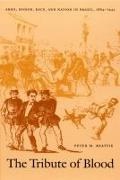Ulteriori informazioni
"This is the most original work on Brazilian social history by a U.S. scholar in the last fifteen years. Events and issues become newly understandable in Peter M. Beattie's presentation of military recruitment as a direct measure of state-building in Brazil."--Dain Borges, University of California, San Diego
Sommario
Illustrations
>
Acknowledgments
>
Author’s Note
>
Abbreviations and Acronyms
Introduction: Soldiers of Misfortune, Soldiers by Lot
I. Impressment, Penal Transportation, Defense, and Politics, 1549-1905
1. “Nabbing Time”: The Heritage of Portugal’s Gunpowder Empire, 1549-1905
2. Raising the “Pagan Rabble”: Wartime Impressment and the Crisis of National Recruitment, 1864-1870>
3. The “Law of the Minotaur”? Postwar Reformism and the Recruitment of Law, 1870-1874
>
4. Whipping a Dead Letter: The 1874 Recruitment Law under the Empire, 1874-1889
>
5. “And One Calls This Misery a Republic?”: The 1874 Recruitment Law under the Early Republic, 1889-1905
II. Soldiers, Their Lives, and the Army’s Institutional Roles, 1850-1919
>
6. The Troop Trade and the Army as a Protopenal Institution in the Age of Impressment, 1850-1916
>
7. Brazilian Soldiers and Enlisted Service in the Age of Impressment, 1870-1916
>
8. Days of
Caschaca, Sodomy, and the Lash: Army Crime and Punishment in the Age of Impressment, 1870-1916
III. Implementing Conscription and Reorienting the Army’s Role, 1906
>
9. “Tightening Screw” or “Admirable Filter”?: The 1908 Obligatory Military Service Law, 1906-1916
>
10. Making the Barracks a “House” and the Army a “Family”: Assessing the Conscription Lottery, 1916-1945
Conclusions: Army, Masculine Honor, Race, and Nation
Appendix A: Military Crime Data
>
Appendix B: Army Recruitment Data
>
Appendix C: Populations of Public Disciplining Institutions>
Notes
>
Glossary of Portuguese Terms
>
Bibliography
Index
Info autore
Peter M. Beattie
Riassunto
Analyses the transformation of army [enlisted] recruitment and service in Brazil between 1864 and 1945, using this history of common soldiers to examine nation building and the social history of Latin America's largest nation.

